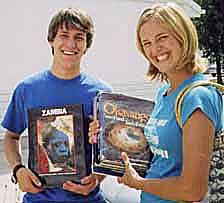Canadian Mennonite
Volume 10, No. 18
September 18, 2006

Parable of the Twinkies
 |
The question, “How do I get these people to stop giving me Twinkies?” has kept me awake nights since I began my work as a Mennonite Central Committee (MCC) teacher-trainer in Egypt. It’s not that I have any particular complaint about the Twinkies themselves. It’s true that the “creme” filling is suspiciously inorganic, but eating the golden outer cake in the heart of the Egyptian desert evokes images of Israelites eating manna. So the Twinkies are okay. My problem is more with the givers of the Twinkies.
My work with MCC is based on observation of individual primary school teachers in their classrooms. After each observation, I sit and discuss the lesson with the teacher. It is during these conferences that the Twinkies inevitably appear.
Egyptian teachers are sorely undervalued; their social standing is low, and their wages lower. For putting up with 50 seven-year-olds in a cramped classroom for six hours a day, a beginning teacher receives a little over seven Egyptian pounds (a bit less than $1.50). An experienced teacher’s daily wage tops out at around $3 a day. In either case, the cost of the Twinkie and its obligatory accompanying Coke represents a hefty proportion of the teacher’s meagre income.
So you can see my problem.
Here I am, an “expert” all the way from Canada. I am supposed to be giving to these teachers. Yet with blatant disregard for this distinction, they insist on treating me with relentless hospitality.
At first, I thought that maybe the problem was that they believed I was hungry; perhaps they worried that I had not learned how to acquire food in my new home. So one day I brought three Twinkies to work with me. At the end of the day, I came home with seven. It was like the parable of loaves and fishes gone wrong! (In fact, the longer I stay in Egypt, the more I wonder whether what happened that day on the mountain was that the disciples passed the baskets to the Egyptians first!)
The generosity I have experienced here has not been limited to the teachers I work with. Virtually every Egyptian I have met has extended hospitality beyond my expectations—the seminary student who brought us to his village for a meat meal and paid for all our transportation; the doctor who works in the slums of Cairo, yet paid for my microbus fare home; the many friends we’ve made who prepare fancy meals when we visit them and bring gifts when they visit us; and, of course, the teachers with their Twinkies.
Aside from the potential implications to my waistline and dental health, the part of me that is most impacted by all of this is my pride. It is always humbling to be the recipient of a generous gift; it is beyond humbling to receive a generous gift when the giver can barely afford it—so humbling, in fact, that it makes me incredibly uncomfortable.
This brings me back to the question I asked at the beginning. I suspect that I should not be asking, “How can I make them stop giving?” but rather, “How can I receive graciously?” But this, too, is a difficult question for which I have not found a simple answer. I think I must keep humbling myself to receive these gifts.
As I do this, I try to take strength from Jesus’ example. When Mary unexpectedly anoints him with valuable perfume, he does not object or shy away. Instead, he receives the gift graciously and, in so doing, honours the giver and the spirit of the gift.
Our North American culture’s focus on self-reliance and independence cultivates in us a desire to be self-sufficient—to be in the powerful position of being able to give and to be uncomfortable when on the receiving end of charity. In a round-about way, I’ve been made aware of my own insignificance through this struggle. Our all-powerful God gladly accepts the gifts that each of us brings, however small. God cherishes even the widow’s offering. As Christians, we must be gracious in both giving and receiving.
So, regardless of how uncomfortable it makes me, I will keep accepting the Twinkies. I will honour the teachers’ desire to give to me, just as I want to give to them. I will try to learn the lessons God is teaching me about grace and generosity. And, don’t worry, mom. I will do an extra-thorough job of brushing my teeth.
More than 100 young adults begin one-year MCC terms
Winnipeg
 |
Mark Epp-Tiessen and Kira Friesen of Charleswood Mennonite Church in Winnipeg are among 103 Canadian and American young adults who are beginning one-year assignments through the Mennonite Central Committee’s Serving and Learning Together (SALT) program and its International Visitor Exchange Program (IVEP).
The two were feted with a send-off brunch in late July, hosted for them and their families by Mennonite Central Committee (MCC) Africa alumni Eric and Kathy Fast and Peter and Leona Dueck Penner.
Epp-Tiessen, who holds a degree in religious studies from the University of Winnipeg, will be teaching math, science and perhaps some commerce courses to high school students at the Frances Davidson Secondary School in Macha, Zambia, for a year under the MCC SALT program. The high school was established by the Brethren in Christ Church many years ago.
After a week of “very enjoyable” orientation at MCC headquarters in Akron, Pa., he left for southern Africa on Aug. 21, on a “high note,” according to his father, Dan Epp-Tiessen.
Friesen, a Canadian Mennonite University student, left for Gaborone, Botswana, on Sept. 6. She is going as an intern with MC Canada Witness and will be helping out in the youth or children’s programs at a church, among other duties.
Besides Africa, the 51 SALT volunteers are serving with MCC partner organizations in Latin America, Asia, Europe and the Middle East. Through IVEP, 52 young adults from countries in these regions are beginning volunteer positions in Canada and the United States.
For the first time in MCC history, participants in SALT and IVEP met for a joint orientation session from Aug. 14 to 18 in Akron. During the week, participants got to know each other, worshipped together and prepared to begin their assignments around the world.
IVEP participants work in a variety of assignments, including with computers, children in day care centres and residents in retirement communities, as well as language assistants in colleges, teaching assistants in elementary schools, pastoral assistants in churches and as farm workers.
SALT participants work with children in day care centres, orphanages and shelters, teach English and other subjects, and serve in human rights and social service organizations.
IVEP participant Stephannie Dinalissa Maay, 21, came from Serue, a small town in Papua, Indonesia. Maay belongs to Christian Church of Indonesia in Papua and will work at a Lutheran family service centre in Philadelphia.
Maay has never travelled outside Indonesia before, and is looking forward to improving her English, learning about another culture and serving God through her assignment. “I never imagined that I would come here,” Maay says.
During the orientation session, Maay met Andrea Shalay, a 27-year-old student of international politics from Kaministiquia, Ontario. Shalay will begin an assignment at a women’s centre run by Maay’s church in Papua, Indonesia, and she quizzed Maay about Papuan language and culture.